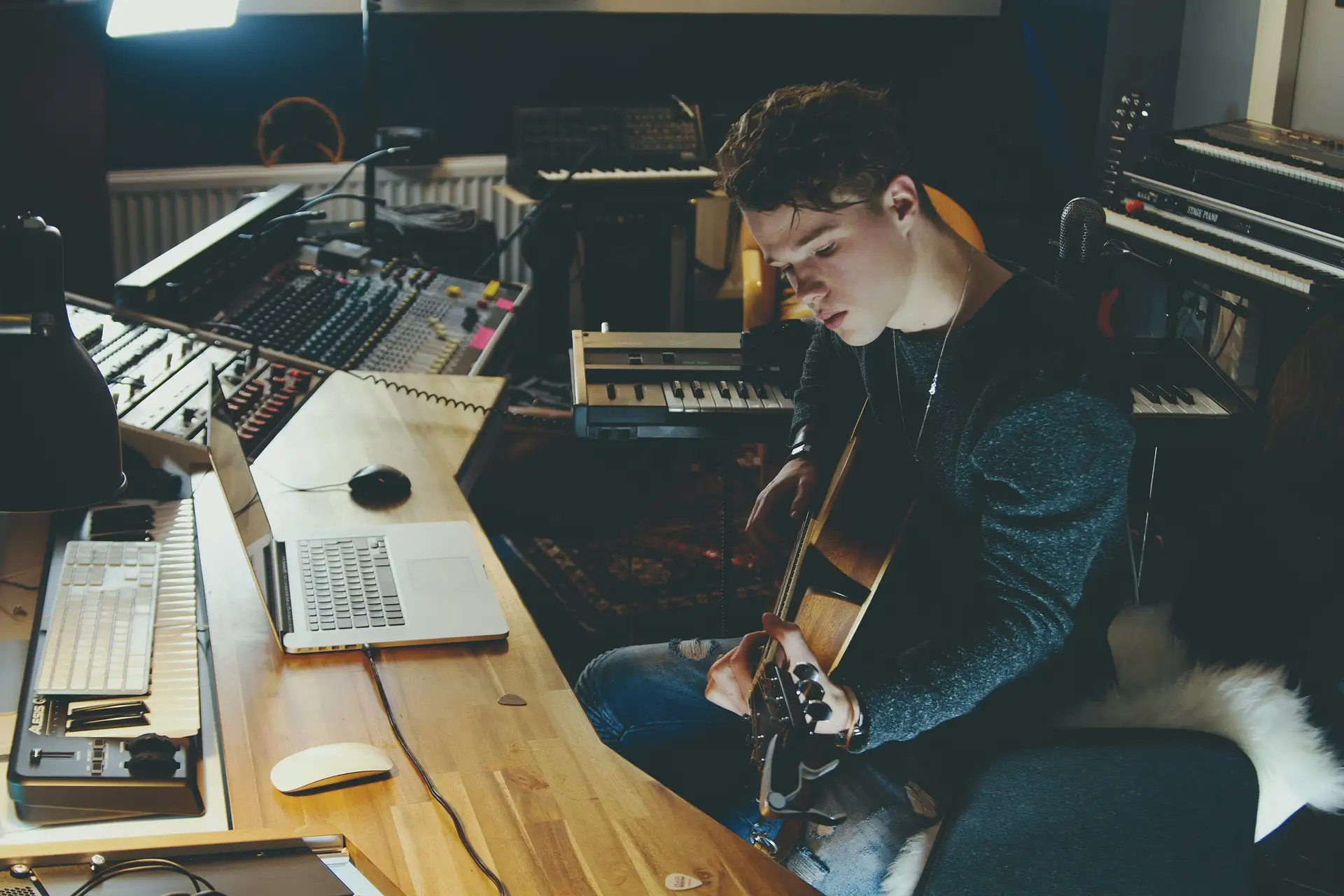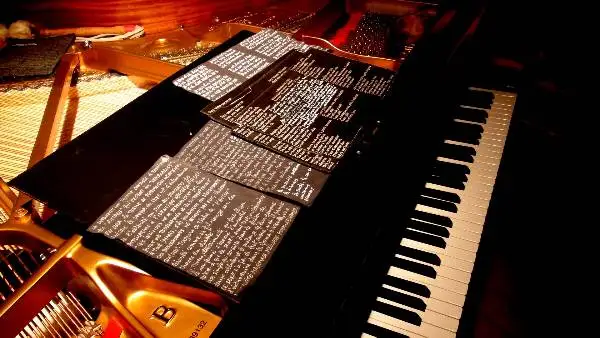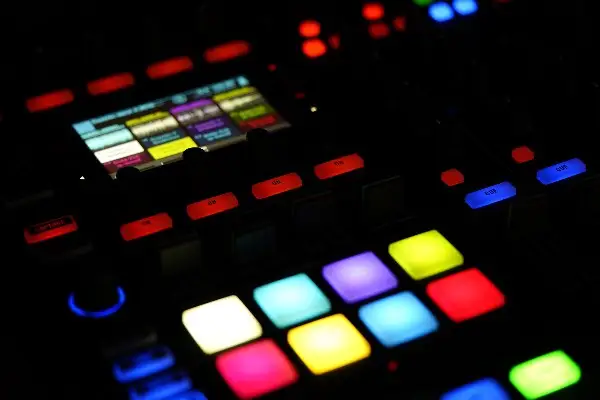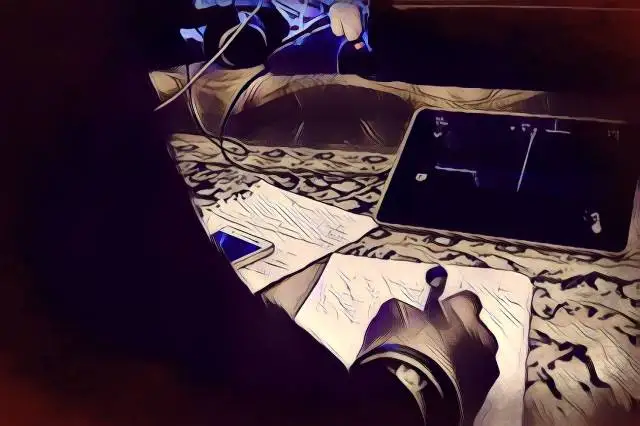Writing a song is a pleasurable process for every singer-songwriter out there, yet they will undeniably recognize the struggle that comes with it if you ask them. We tend to see great songwriters like John Mayer as artists who drop new ideas over a great melody line , and it miraculously sounds good without any creative process whatsoever. When in reality every great songwriter has a complex songwriting process that they follow meticulously to produce a good song.
In today's fast-paced music industry, we don't get any chance to see the musical journey behind a track. We listen to it and then move on, not knowing how it went from its initial idea to an entire song structure. We are satisfied with how it makes us feel, but never look beyond and try to understand the writing process.
Lyric writing is without a doubt one of the most important aspects of writing songs. Music producers know that and prefer hiring a songwriter who knows his process, rather than just throwing lyrics randomly over their musical ideas.
Even successful bands arrive at a point where they need to engage a songwriter other than the initial singer-songwriter. It helps them enhance the quality of their music production process and in some cases overcome writer's block . This shows you how much work behind the curtains we don't witness.
You started your music career, you dropped a beautiful chord progression over a catchy beat. Now you need to write, but the lyrics you put on paper can't seem to satisfy you. This is most likely a writing process issue, and in this article, we want to show you 10 actionable techniques that will showcase tangible results.
These songwriting tips apply to any type of songwriting career, and by reading them through you will be able to recognize all types of blocks in your creative process. You will then find yourself able to engage them with one of these actionable tips we're going to present.
You will be able to write songs faster, authentically, and without losing yourself in overthinking.
Let's dive in.
1. Keep It Simple.

This is one of those tips that are easier said than done. It's very understandable to obsess over writing songs that will blow your audience's mind, yet the irony here is that a vast majority of pop and rock hit songs are mainly simple. The chord progressions are easy to apprehend and move our bodies to, and the lyrics are everything but complex.
We think we need some kind of revolutionary lyrical content that will make our name echo everywhere, but take our favorite songs throughout history and you'll realize they endured time because they were simple to remember.
What matters is what you have to say to your audience. When you write a song , think about your listeners and make it simple for them to understand your message and remember your melodies. It is what makes a lot of pop hits catchy and unforgettable.
2. Record Yourself.
It is very common for songwriters to dismiss a new song before even recording a draft, only to see other people love it once it's on tape. Try to make it a habit to record yourself once in a while during the process. Every time you add something or change something, take out your mic and record it . This will give you an idea of how you sound, what works for your style and what doesn't.
Even if you don't like it in the end, you'll find yourself with more ideas you can come back to later while creating music. It is a great feeling to come back to an old idea on your voice recorder, and realize that it has potential. On top of that, the groundwork has already been laid for you by your past self.
Recording yourself is also a great way to share with your friends and family for feedback, as a songwriter needs to get a glimpse of how the audience will react to his/her style.
3. Work On Your Melody Line.

Sometimes your melody line doesn't match what you were trying to convey in your production, leaving you therefore frustrated with yourself. You try your best to add a bassline or write lyrics, yet it just doesn't sound right. Try working on your melody or even changing it.
Change is inspiring, that's why creators love to change scenery when they experience writer's block. Changing one or many aspects of your melody will create a new feel to the song, giving you a different musical mental scenery that you might get inspired from. Don't hesitate to try it.
Work on your chord progressions, use a different instrument or even add new ones. It might jump-start your brain and give it a fresh set of new ideas. It is of course recommended to save a draft of your melody before you start working on it or completely change it.
4. Take Breaks.
When we work on our songs, we tend to make them personal. If we ever meet writer's block when we write music, we try to force ourselves into finishing the song. Unfortunately, that's not how the creative brain works, you will most likely have a breakthrough the day after while showering or innocently having coffee outside.
The creative brain works better in low-stress environments, where it can relax and connect dots to provide more ideas. So if you're feeling stuck with your song, take a break. It is so important for our brain to rest from time to time. Forcing the songwriting process generally worsens its quality.
We live in a society that encourages high brain activity from the moment we wake up until we sleep, but it doesn't have to be this way. If you do some research on the most creative people on earth, you'll discover that they do not take resting their brains lightly. It is for them a process that is as important as their art.
5. Practice On Rough Drafts.
Not every song has to be made for publishing, especially if you are a beginner. You need rough drafts to build your songwriting muscles. It is one of the most important songwriting tips . We drop some chord progressions, add a kick and snare and decide this will be the next song out there. It doesn't have to be. Think of it the same way as a bodybuilder who needs to repeat the same movements for years before exposing himself in competitions, your songwriting needs the same type of repetition to achieve a certain mastery.
Don't be afraid to play and experiment on your track. Listen and decide if you sound good, then practice making more music. The right track will come along and you will know when you're ready to publish. Acknowledging that you're working on a rough draft will give permission to your brain for more freedom when working on your song. You never know when a rough draft might turn into a good song.
6. Set Some Limitations.

Creativity has an aspect of spontaneous inspiration that attracts artists, and it does have its perks. However, bringing some limitations to your inspiration might help you become more efficient in your songwriting process. Define characters, a short story, a limited number of chords, or anything that will set directions and make your decisions while composing easier later on.
This structure will breed your progress so naturally that you won't even notice yourself advancing in your song. You think you're only sticking to the limits you set for yourself, but instead, you're growing your songwriting in the same direction. This way every element of your song will fit in your vision because it was defined before starting.
Needless to say, most songs nowadays follow the same overall structure with little tweaks to make it feel different. Especially pop songs.
7. Capture Your Ideas.
One of the most common mistakes within beginner songwriters is to leave an idea unchecked before they're in the studio. Most of our ideas come when we're showering, eating, or driving on a highway, and the most common reflex we have is to leave it until we go home. We finally go home and find nothing, as it has been buried beneath conversations at work or something else.
This is why songwriters must carry a voice recorder for melodies and sounds and a notebook for lyrical content. The moment you get an idea you take it down on paper and record how you think it would sound on your voice recorder. Your idea is then secure and ready to be utilized back at the studio.
If you feel like it's too much to carry a notebook and a voice recorder, your phone can do all of it. Just capture your ideas and see your productivity rise through the skies.
8. Study Your Track References.

When writing a song, it is very helpful to keep your track reference in the back of your mind. Use a song that inspires you towards the direction you want your songwriting to take. Study the beat, dissect the bassline and analyze the chord progressions. This gives you something to compare your song to in terms of sound quality and overall completion.
It is a common practice among music producers. When you work with them, they usually ask for a reference track. It gives them an idea of how the song is going to evolve and generally makes their process easier.
You can use this tip at any moment of your process, even if you're not writing music. Take your favorite songs and deconstruct them from title to outro. Learn what makes them great songs bit by bit, and you'll find this information ready next time you write a song.
9. Learn Music Theory.
Music theory will broaden your understanding of music and therefore bring more elements to your brain to synthesize into musical ideas. It will make you look at common chord progressions differently, and you'll be able to enhance simple ideas logically.
You don't need to learn it all at once, just some basic understanding to enhance the quality of your materials and musically know what you're doing. You could start with the theory behind a major chord or a minor chord progression, and learn different shapes to play them for example.
It might seem like a fancy word, but music theory is just the meaning behind everything we do in music. Your songwriting will only benefit from it, and you won't stay stuck in the same four chords anymore.
Here's a list of what we think will help your songwriting right away:
- Rhythm: Time signatures, off-beat rhythms, etc.
- Music sheet reading: Clefs, note durations rhythms, etc.
- Chord Progressions: Common chord progressions, cadences, chord shapes, etc.
- Scales: Major & minor scales, keys.
10. Write Away From Your Instruments.

It might seem very logical to stay on your piano when writing lyrics, yet it's not the most innovative way. It might work great, but there is a risk of falling into familiar songwriting patterns.
Your skills on an instrument are limited, your imagination is not. Therefore rather than starting on an instrument, go take a walk and hum some melodies.
Once you get a topline and a structure, go home and set up a chord progression that supports it. It's about bringing your instruments and tools to your vision, not the opposite.
The famous Tom Waits had a very unique way of songwriting. He would sit down around four or five radios, and turn on a different channel on each one of them. He would listen to the storm of overlapping songs, and get inspired for his next song. This shows that sometimes you have to step away from your instruments and try unique ways to find inspiration.
One very common beginner mistake is to produce a whole song without lyrics, and then struggle to fit them in. Your project should grow around your lyrics, as they are a key component in the song structure.
11. Learn Song Structures.
If you start a jigsaw puzzle without knowing what the final result looks like, you will most likely blindly gamble on which piece goes where. The same goes for songwriting. You need a canvas for your creative process, and you need it to be personalized. To each song its song structure.
There are many song structures out there, and they differ depending on the song genre you're aiming for. The most famous one is the pop structure ( verse , pre-chorus, chorus ) which worked so well that it became a formula. A recipe for success.
Of course, if you're aiming for something else, there are other song structures that you can try and see if they work for you. The most important thing here is to learn how they can be used to construct your song, and help you develop your project using your chosen structure as a compass.
12. Diversify Your Approaches to Writing Songs.

What might have worked for your previous song might not do so for the current one. This is why you will sometimes struggle with a song, even though you're using the same approach you did in your previous work. It's completely normal, and it's good that you're struggling with a song this way. This means that your song has novelty in it, and you can't treat novelty the same way you did old projects. You need a new approach.
By new approach, we mean that you should change your process one way or another, at least until something works. If you're used to writing music before lyrics , try the opposite. If you always write music on your guitar, try your keyboard this time. If you write the title before the song, try the opposite. Use anything to let your brain know that you're not doing it the old way, and it will get you more ideas to help with that.
13. Reflect On Your Personal Experience.
The best songs out there are songs we relate to. We do enjoy beautiful melody lines and complex drum patterns, but it hits differently when the song speaks of a situation you're familiar with or that you've been through. This is why we recommend using your personal experience as an anchor for your song.
Try defining which experience you want to share with your audience, and set the vibe you want to write in. This will set the tone and make your decisions easier in your process simply by bringing every element of your song to that same story you're trying to tell. It will make your life easier, and give your audience a song that makes sense to them too. Especially if they know what you're talking about.
This is why songs like "Imagine" or "We are the world" had an eternal international impact. Everybody could relate to the stories told, and everybody understood the song in all its homogeneous elements.
14. Go Somewhere Else.
Creativity and routine are like water and oil, they don't mix at all. Your brain has way more chances of being creative if it is stimulated, and what better stimulation than a novelty? If you always work in your studio, change the scenery and go to a park. If you're always around the same people, call an old friend or meet someone new. Try anything that will break the routine pattern and put your brain in discovery mode.
It is very common amongst singers and songwriters to isolate themselves away from the day-to-day activities and come back after some time with lyrics ready to be used for their songs. It is no magic at work here, just the exciting food for our brain that is novelty. This is of course recommended to a certain degree where your social life doesn't suffer from it.
15. Ask For Help.
We may have kept this one until the end of this article, but it is one of the most necessary songwriting tips. No artist made it alone, especially in the music industry. It takes a whole team to go to places, and a songwriter needs to ask for assistance.
Go to your friends, ask people you know in the industry, or even send an email to a poetry professor. Don't be shy when it comes to learning and growing, as it is by reaching out that you'll be able to get answers on how to improve your music career.
The biggest ideas come through collaboration, and artists know that. It's the main reason why 'featurings' are a big aspect of the music industry. You might believe more in a "make it all alone" attitude, but that won't serve you in the long run. There will come a time when you'll reach out for help, you might as well do it now.
16. Use Samples.

Sampling is a major technique amongst music producers. It's a process where you work with ready-to-use materials ( melody loops , drum patterns, etc) as parts of the song you're writing. It makes your writing process flow easier, and you're at the same time reaching out for help since you're using someone else's material. It's like someone is helping you with your song by providing a part that will enhance your production.
There has been some kind of dilemma around this practice, where it was deemed inauthentic by many critics. However, some great pieces were produced by artists using samples, and there is nothing wrong with it. Music is still the same 12 keys repeated in different ways and patterns.
Conclusion: Where there is a will, there is a way.
There are many other actionable ways that can help you improve your songwriting, these are just the ones that we deemed to be the most practical. Some of them might appeal to you more than others, but make sure to keep them all in the back of your mind. They will come in handy. Don't forget that songwriting is supposed to be fun before anything else, and make sure you write from an authentic place. The rest will follow.





